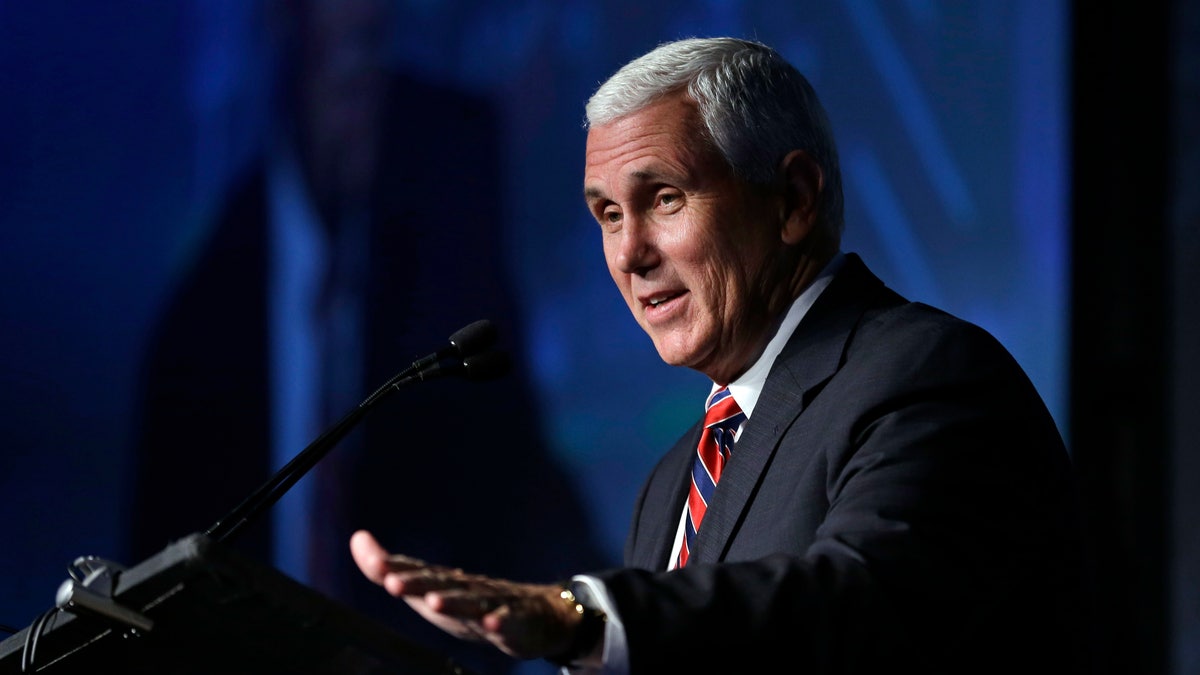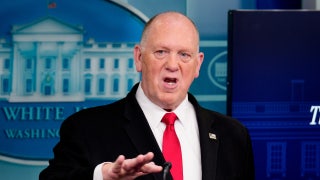
July 29, 2016: Republican vice presidential candidate, Indiana Gov. Mike Pence speaks at the American Legislative Exchange Council annual meeting in Indianapolis. (AP)
If history’s any indication, America is in for a letdown come Tuesday night when the two vice presidential hopefuls square off at Longwood College, which is a good hour’s drive west of Richmond, Virginia.
And it has nothing to do with evening’s two participants – Virginia Sen. Tim Kaine and Indiana Gov. Mike Pence.
In 2012, about 51.4 million Americans tuned in watch Vice President Joe Biden and Rep. Paul Ryan have at it – about 20 million fewer viewers than the first of the three Obama-Romney debates.
After the hot mess that was last week’s Trump-Clinton debate drew a record 85 million viewers? Tuesday’s drop-off could be even more dramatic.
Here are five things to look for, deep in the heart of Old Virginny:
1. Men On A Mission? Every vice presidential debate begs the question of marching orders – is the mission to build up the ticket, or tear down the opposition?
This is particularly intriguing as: (a) neither Kaine nor Pence enters the debate with a reputation for wielding a political machete and (b) arguably, it’s in the best interest of each party to stay on the high road – for one night, at least.
This would seem more urgent a matter for Pence, given Donald Trump’s media tailspin the past week. For the Republican ticket, the nationally televised debate affords an opportunity to re-connect the with the conservative base and reset the conversation more to Trump-Pence’s liking – namely, a failed government in Washington run by an over-entitled political cartel.
As for Kaine, and also assuming he opts for higher ground, just how expansive is his message?
Yes, the Virginia senator is one half of a national ticket. However, Kaine’s on that ticket for one main reason: to protect Virginia’s 13 electoral votes. If you’re playing the debate drinking game, bottoms-up every time the bilingual candidate invokes the commonwealth, or opts to habla en Español.
2. A Moment? Most vice presidential debate are forgettable fare – filler for between the more anticipated presidential encounters (the next Clinton-Trump debate is Sunday, Oct. 9 in St. Louis).
However, some past veep debates stand out for moments that have stood the test of time.
In 1988, then-Texas Sen. Lloyd Bentsen stuck a shiv into Dan Quayle (“Senator, you’re no Jack Kennedy”). In 1976 (the nation’s first-ever veep debate), then-Kansas Sen. Bob Dole characterized the First and Second World Wars, Korea and Vietnam all as “Democrat wars”.
Then there’s 1992 and Admiral James Stockdale asking, “Who am I? Why am I here?”.
About that moment: Stockdale actually had a longer statement he’d planned to read, but debate organizers wouldn’t let him bring it onstage. That left Stockdale to awkwardly ad-lib his opening.
A side note about these moments: none seriously affected the outcome of their elections. The zinger that Bentsen landed at Quayle’s expense? The Democrats lost 40 of 50 states that year.
3, More Red Meat? One thing notable about the first presidential debate: the bounty of issues left unexplored – guns, energy (coal and oil vs. renewables), defense spending and what to do about spiraling entitlement costs, to name but a few.
Could it be that the vice presidential debate is the adult conversation the nation wants, or will it be another deep dive into back taxes, birth certificates, beauty queens and bimbo eruptions?
If I’m Pence, I’m taking the high road . . . to Supreme Court appointments – the next president getting perhaps as many as four picks over the course of one or two terms.
And if I’m Kaine: immigration reform, which would broaden his target constituency beyond the Old Dominion to swing voters in Florida, Colorado and Nevada.
4. How Moderate The Moderating? The first Clinton-Trump debate was six 15-minute segments. Tuesday’s debate will consist of nine 10-minute segments.
The good news: more segments could mean more policy ground gets covered.
The bad news: it could also mean more of the same moderator meddling that plagued last week’s debate.
Keeping the line moving in Tuesday’s debate will be CBS’ Elaine Quijano, who’ll be setting several milestones.
Some conservatives have grumbled about ties between Tim Kaine and CBS (Bob Barnett, the Washington super-lawyer who’s been playing the role of Pence in Kaine’s debate prep, is married to CBS News correspondent Rita Braver).
Four years ago, ABC’s Martha Raddatz moderated the debate between Vice President Joe Biden and Rep. Paul Ryan. The complaint afterwards: Raddatz gave Biden way too long of a leash.
The bottom lime: give Quijano the benefit of the doubt.
But also keep an eye on the clock and the candidates’ mike time.
5. 2020 Auditions? One final way to look at this debate: November’s winner will be the next vice president; the loser could be in line to be his party’s presidential nominee in 2020.
Such was the case for Walter Mondale in 1980’s vice presidential debate, George H.W. Bush in 1984 and Al Gore in 1996.
Things didn’t work out as well for Joe Lieberman – the Democratic half of the 2000 vice presidential debate, but a failed presidential hopeful in 2004 – or John Edwards, who debated in 2004 but crashed and burned in 2008.
Both Pence and Kaine have congressional and gubernatorial records to defend. They also have records to tout. We’ll see just how strongly the two embrace their running mates, both of whom are polarizing figures.
Not that anyone is going to be thrown under the bus in Farmville (the college town in Virginia, not the social network game).
But a little distancing from the top of the ticket might help either Kaine or Pence escape their running mates’ exhaust fumes.








































